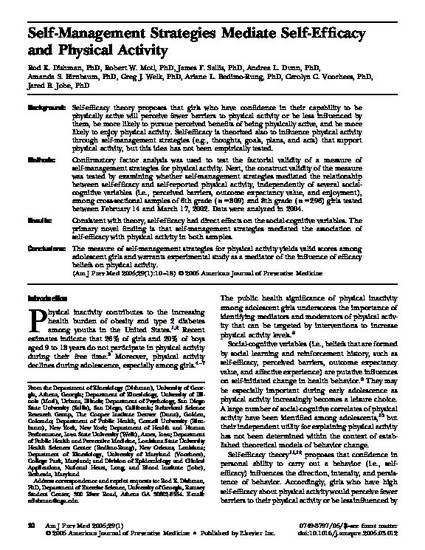
Article
Self-Management Strategies Mediate Self-Efficacy and Physical Activity
Science Direct
Document Type
Article
Publication Date
7-1-2005
Disciplines
- Applied Behavior Analysis,
- Biological Psychology,
- Child Psychology,
- Cognitive Behavioral Therapy,
- Cognitive Psychology,
- Developmental Psychology,
- Experimental Analysis of Behavior,
- Health Psychology,
- Human Factors Psychology,
- Medicine and Health Sciences,
- Mental and Social Health,
- Personality and Social Contexts,
- Psychoanalysis and Psychotherapy,
- Psychology,
- Public Health,
- Social and Behavioral Sciences and
- Transpersonal Psychology
Abstract
Self-efficacy theory proposes that girls who have confidence in their capability to be physically active will perceive fewer barriers to physical activity or be less influenced by them, be more likely to pursue perceived benefits of being physically active, and be more likely to enjoy physical activity. Self-efficacy is theorized also to influence physical activity through self-management strategies (e.g., thoughts, goals, plans, and acts) that support physical activity, but this idea has not been empirically tested.
DOI
DOI: 10.1016/j.amepre.2005.03.012
Published Citation
Dishman, Rod K., Robert W. Motl, James F. Sallis, Andrea L. Dunn, Amanda S. Birnbaum, Greg J. Welk, Ariane L. Bedimo-Rung, Carolyn C. Voorhees, and Jared B. Jobe. "Self-management strategies mediate self-efficacy and physical activity." American journal of preventive medicine 29, no. 1 (2005): 10-18.
Citation Information
Amanda Birnbaum, Rod K Dishman, Robert W. Motl, James F. Sallis, et al.. "Self-Management Strategies Mediate Self-Efficacy and Physical Activity" Science Direct (2005) Available at: http://works.bepress.com/amanda-birnbaum/2/
